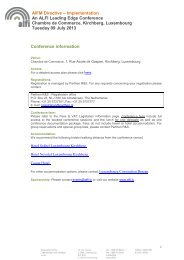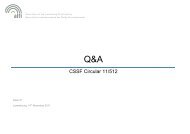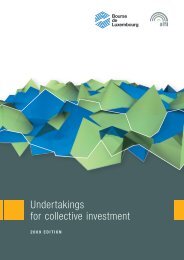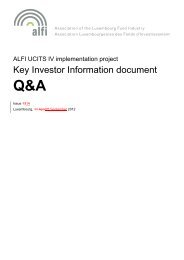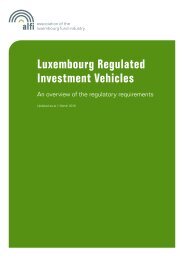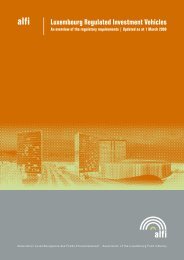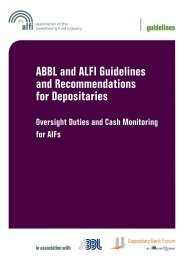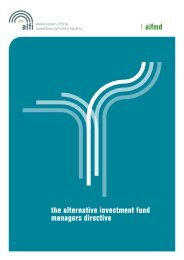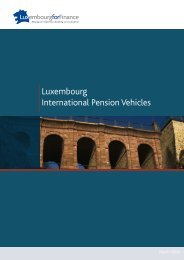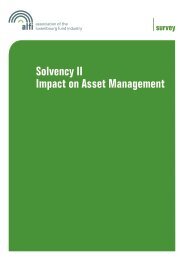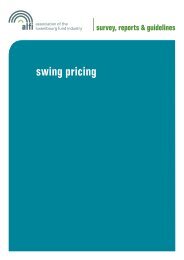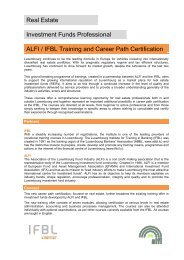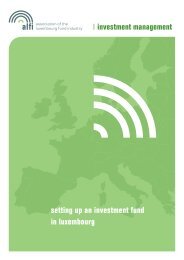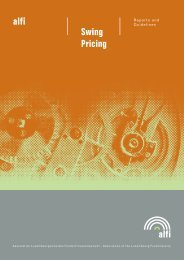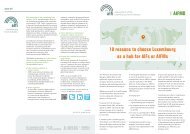ä¸åœ‹ luxembourg: your bridge between china and europe - Alfi
ä¸åœ‹ luxembourg: your bridge between china and europe - Alfi
ä¸åœ‹ luxembourg: your bridge between china and europe - Alfi
Create successful ePaper yourself
Turn your PDF publications into a flip-book with our unique Google optimized e-Paper software.
中 國<br />
<strong>luxembourg</strong>:<br />
<strong>your</strong> <strong>bridge</strong> <strong>between</strong> <strong>china</strong> <strong>and</strong> <strong>europe</strong>
contents<br />
I QDII <strong>and</strong> QFII 3<br />
A. Background 3<br />
B. Eligible investments 4<br />
II Your <strong>bridge</strong> <strong>between</strong> the European <strong>and</strong> Chinese markets: why Luxembourg? 5<br />
A. UCITS: the most relevant structures for investment flows 5<br />
<strong>between</strong> China <strong>and</strong> Luxembourg<br />
B. A complete range of products <strong>and</strong> solutions 7<br />
C. A broad double-tax treaty network 7<br />
D. Luxembourg – Hong Kong, a natural gateway for Chinese investors 8<br />
Glossary 9<br />
2
I. QDII <strong>and</strong> QFII<br />
China is changing: since April 2006, its<br />
Qualified Domestic Institutional Investors<br />
(QDII) program has given domestic investors<br />
access to markets outside the country, opening<br />
new opportunities for investment funds.<br />
At the same time, Qualified Foreign Institutional<br />
Investors (QFII) are offering access to<br />
securities markets in China, since they can<br />
invest in the country’s restricted renminbidenominated<br />
A-share <strong>and</strong> domestic bond<br />
markets.<br />
The 2008 signature of a Memor<strong>and</strong>um of<br />
Underst<strong>and</strong>ing <strong>between</strong> regulators in Luxembourg<br />
<strong>and</strong> China took the process one step<br />
further, allowing Chinese institutionals to<br />
invest in Luxembourg’s regulated investment<br />
vehicles. Given its traditional strengths as a<br />
fund domicile, the Gr<strong>and</strong> Duchy is a natural<br />
gateway for investment flows into <strong>and</strong> out<br />
of China. As most bank QDII products invest<br />
in or replicate foreign UCITS funds, Luxembourg,<br />
as a leading jurisdiction for UCITS<br />
products, is the natural home of these<br />
products.<br />
Chinese investors gain access to Luxembourg’s<br />
regulated financial products.<br />
In 2008, a Memor<strong>and</strong>um of Underst<strong>and</strong>ing<br />
was signed <strong>between</strong> Luxembourg’s Commission<br />
de Surveillance du Secteur Financier (CSSF)<br />
<strong>and</strong> the China Banking Regulatory Commission<br />
(CBRC). It allows QDIIs to invest on behalf<br />
of their clients in financial products regulated<br />
by the Luxembourg Supervisory Authority.<br />
The 2008 MoU positions Luxembourg as<br />
a gateway to China, clearing the way for<br />
Luxembourg fund management companies<br />
to reach investors from the booming Chinese<br />
fund industry.<br />
Creating a joint venture with a local partner<br />
is the preferred way of entering the Chinese<br />
market for foreign Fund Management Companies<br />
(FMC).<br />
A. Background<br />
The genesis of the QDII program can be<br />
found in a brief document issued by the<br />
People’s Bank of China (PBOC) in April<br />
2006. This sets out the framework for<br />
investments by commercial banks,<br />
insurance companies <strong>and</strong> fund managers.<br />
Most banks’ QDII schemes replicate an index<br />
<strong>and</strong> invest in a single asset class, with a<br />
minority replicating a single international fund.<br />
Yet QDII products issued by fund managers<br />
show that they are investing on the Hong Kong<br />
market, in Chinese-related securities or in top<br />
performing foreign funds.<br />
3
B. Eligible Investments<br />
CBRC Circular: QDIIs for commercial banks<br />
On 10 May 2007, the China Banking Regulatory<br />
Commission (CBRC) issued its Circular<br />
on Adjusting the Scope of Overseas Investment<br />
by Commercial Banks for Overseas Wealth<br />
Management Business for Clients, thus<br />
allowing onshore commercial banks to invest<br />
in offshore equity within certain limits. This<br />
significantly exp<strong>and</strong>ed the scope of investment<br />
authorized for commercial bank QDIIs.<br />
CSRC measures: QDIIs for fund managers<br />
<strong>and</strong> securities houses<br />
On 18 June 2007, the China Securities<br />
Regulatory Commission (CSRC) issued the<br />
Interim Measures for Overseas Securities<br />
Investment by Qualified Domestic Institutional<br />
Investors <strong>and</strong> its implementation notice,<br />
allowing qualified Chinese fund management<br />
companies <strong>and</strong> securities firms to invest in<br />
offshore financial markets.<br />
The funds or collective schemes may invest in<br />
a wide range of financial products.<br />
Compared to the QDII regime for commercial<br />
banks, CSRC’s rules provide more<br />
flexibility in terms of product development,<br />
as indicated above.<br />
The Qualified Foreign Institutional Investor<br />
(QFII) scheme allows foreign institutions to<br />
trade Chinese A-shares <strong>and</strong> other financial<br />
instruments via special accounts opened at<br />
designated custodian banks.<br />
4
II. <strong>your</strong> <strong>bridge</strong> <strong>between</strong> the <strong>europe</strong>an <strong>and</strong> chinese markets: why <strong>luxembourg</strong>?<br />
The Memor<strong>and</strong>um of Underst<strong>and</strong>ing signed<br />
<strong>between</strong> Luxembourg <strong>and</strong> China’s regulators<br />
makes Luxembourg one of the few financial<br />
centers to have such an agreement. 1 Thanks<br />
to this agreement, QDIIs are able to invest<br />
directly in Luxembourg financial products,<br />
including investment funds domiciled in<br />
Luxembourg.<br />
Luxembourg is actively building relationships<br />
with Asian markets, <strong>and</strong> has concluded<br />
11 treaties to avoid double taxation with<br />
various Asian countries or regions (including<br />
the People’s Republic of China, Japan,<br />
Indonesia, Malaysia, South Korea, Mongolia,<br />
Thail<strong>and</strong>, Singapore, Vietnam, India <strong>and</strong> the<br />
Hong Kong Special Administrative Region).<br />
Luxembourg offers<br />
Investors:<br />
A strong tradition of investor protection<br />
A stable democracy <strong>and</strong> strong economy:<br />
Luxembourg is a founding member of the<br />
European Union<br />
A knowledgeable <strong>and</strong> responsive regulator<br />
Proactive legislation: a close working<br />
relationship <strong>between</strong> the business community,<br />
the government, <strong>and</strong> legislators underpins<br />
the Gr<strong>and</strong> Duchy’s innovative legal<br />
framework<br />
A tradition of financial expertise across all<br />
related professions<br />
A unique concentration of investment fund<br />
industry experts in all aspects of product<br />
development, administration <strong>and</strong> distribution<br />
Extensive experience in technical investment<br />
fund solutions, including multiple share<br />
classes <strong>and</strong> pooling<br />
Fund lawyers, audit firms <strong>and</strong> tax advisors<br />
experienced in cross-border registrations of<br />
both UCITS <strong>and</strong> non-UCITS funds<br />
A. UCITS: the most relevant<br />
structures for investment<br />
flows <strong>between</strong> China <strong>and</strong><br />
Luxembourg<br />
UCITS <strong>and</strong> other regulated investment vehicles<br />
play a significant role in the development of<br />
QDIIs, since Chinese banks <strong>and</strong> fund managers<br />
are hesitant to invest directly on foreign<br />
markets.<br />
The reason is simple: funds are an easy way to<br />
invest in the global market, tapping into<br />
experienced asset management specialists in<br />
worldwide markets without having to set up<br />
a complex back office to h<strong>and</strong>le administrative<br />
tasks. UCITS is the acronym for “Undertaking<br />
for Collective Investment in Transferable<br />
Securities”. It refers to European Directive<br />
85/611/EEC dated 20 December 1985, which<br />
set up a single regulatory regime across the<br />
European Union for open-ended funds investing<br />
in transferable securities such as shares <strong>and</strong><br />
bonds, with a view to defining high levels of<br />
investor protection. This Directive regulates<br />
the organization, management <strong>and</strong> oversight<br />
of such funds, <strong>and</strong> imposes rules concerning<br />
diversification, liquidity <strong>and</strong> use of leverage.<br />
UCITS may be set up in an “umbrella”<br />
structure whereby various sub-funds are<br />
created to operate as distinct entities.<br />
Accordingly, a UCITS may have several<br />
sub-funds, each of which may pursue different<br />
policies <strong>and</strong> attract different investors.<br />
UCITS may take a contractual (“FCP”) or a<br />
corporate (“SICAV”) form. Investment funds<br />
that fulfill the requirements of the UCITS<br />
Directive can be freely marketed, under the<br />
European passport, throughout the European<br />
Union.<br />
Although UCITS were initially intended only<br />
to ease the marketing of funds across the<br />
European Union, the UCITS br<strong>and</strong> is now<br />
recognized as the sole truly globally distributed<br />
investment fund product. As a result, an<br />
increasing number of asset managers are<br />
establishing UCITS funds with a clearly defined<br />
global distribution strategy.<br />
1<br />
At 18 July 2011, the website of the CSRC (www.csrc.gov.cn) listed 49 overseas authorities, <strong>and</strong> the CBRC listed 46<br />
(www.cbrc.gov.cn), which had signed an MOU; Luxembourg is listed on both websites. As a consequence, Luxembourgdomiciled<br />
UCITS funds are eligible for QDII portfolios promoted by banks, fund managers <strong>and</strong> securities firms in China.<br />
5
A growing number of countries in Asia <strong>and</strong><br />
Latin America have accepted UCITS as<br />
providing a stable, high quality, well-regulated<br />
investment product with significant levels of<br />
investor protection. And Luxembourg has<br />
successfully positioned itself as the global<br />
leader for cross-border distribution of<br />
investment funds, with the result that today<br />
almost 75% of UCITS funds distributed<br />
internationally are based in Luxembourg.<br />
The main UCITS exporting countries in Europe<br />
74,6 of all UCITS registered<br />
in at least 3 countries (including<br />
home state) are Luxembourg funds<br />
Sources: Lipper Hindsight, PWC Global Fund Distribution 2011<br />
Origin of Luxembourg Fund Promoters<br />
Market shares (%) of promoters of<br />
Luxembourg domiciled funds by<br />
country of origin in terms of assets<br />
under management<br />
Figures as at 31 March 2011; Source: CSSF<br />
6
B. A complete range of<br />
products <strong>and</strong> solutions<br />
UCITS are savings vehicles targeting retail<br />
investors <strong>and</strong> offering the highest possible<br />
protection of investors. Other asset classes that<br />
fall outside the scope of UCITS include funds<br />
for investment in Private Equity & Venture<br />
Capital, Hedge Funds, Real Estate <strong>and</strong> other<br />
alternative assets.<br />
Still, other types of investment vehicles can<br />
be of interest to Chinese professionals making<br />
business in Europe or willing to invest abroad.<br />
These include so-called special investment<br />
funds (SIF) <strong>and</strong> investment companies<br />
specialising in risk capital (SICAR).<br />
C. A broad double-tax treaty<br />
network<br />
Luxembourg has an extensive double-tax<br />
treaty network spanning the world’s major<br />
economies, including the United States,<br />
Canada, Brazil, European countries, South<br />
Africa, the United Arab Emirates, Russia <strong>and</strong><br />
a number of Asian countries (with several<br />
treaties pending). To build a strong relationship<br />
with Asian markets, Luxembourg has already<br />
concluded 11 treaties to avoid double taxation<br />
with various Asian countries or regions. For<br />
many investors, a wide-reaching double-tax<br />
treaty network is a positive factor when<br />
selecting an overseas jurisdiction to perform<br />
foreign investments. As their name implies, the<br />
aim of double-tax treaties is to avoid double<br />
taxation <strong>and</strong> to encourage international trade,<br />
as well as flows of capital <strong>and</strong> labor <strong>between</strong><br />
the contracting jurisdictions. The aim is also<br />
to provide certainty in taxation, combat tax<br />
avoidance <strong>and</strong> tax evasion, <strong>and</strong> eliminate<br />
possible discriminatory taxation.<br />
Under certain conditions, investments in such<br />
Asian jurisdictions could be performed by<br />
minimizing or avoiding tax costs on the return<br />
on such investments, e.g. withholding tax on<br />
dividends, interest <strong>and</strong>, possibly, capital gains.<br />
Readers should note that a double-tax treaty<br />
does not create any additional taxation in<br />
comparison with domestic tax law. Thus, even<br />
if the double tax agreement sets a withholding<br />
tax of 10% maximum on interest payments to<br />
a Chinese resident investor, no withholding tax<br />
applies in Luxembourg on interest payments<br />
made to Chinese resident investors under<br />
Luxembourg domestic tax law.<br />
Nor are double tax treaty benefits exclusively<br />
reserved to fully taxable companies in<br />
Luxembourg.<br />
The tax authorities have confirmed that even<br />
SICAV funds are eligible for treaty protection<br />
under certain conditions. Treaties with the<br />
following Asian countries are applicable to<br />
Luxembourg SICAV/F: China, Indonesia,<br />
South Korea, Malaysia, Singapore, Thail<strong>and</strong>,<br />
Vietnam, etc.<br />
7
D. Luxembourg –<br />
Hong Kong,<br />
a natural gateway for<br />
Chinese investors<br />
The way the Double Tax Agreement (DTA) was<br />
negotiated <strong>and</strong> concluded by both jurisdictions<br />
again highlighted the <strong>bridge</strong> <strong>between</strong> Hong Kong<br />
<strong>and</strong> Luxembourg as a preferred channel for<br />
Chinese investments in Europe, combining as it<br />
does two favorable tax regimes. Hong Kong has<br />
always played a predominant role as a window<br />
on the Chinese market. Hong Kong has made a<br />
lot of effort in increasing the number of DTAs;<br />
since 2010, when 5 DTAs were in place, this<br />
number went up to 21 signed agreements, of<br />
which 10 were in force at the end of June<br />
2011 with the remainder still being under<br />
ratification. If Hong Kong companies do<br />
business or make investments overseas, they are<br />
thus potentially subject to significant tax costs.<br />
Such costs would typically take the form of<br />
withholding tax on interest, dividends, royalties,<br />
capital gains, etc. Since Hong Kong has adopted<br />
a favorable territorial tax system, such taxes can<br />
generally not be recovered in Hong Kong, which<br />
may lead to final tax costs for investors.<br />
It is possible to reduce such costs by using<br />
Luxembourg investment vehicles, provided<br />
certain conditions are met. The DTA <strong>between</strong><br />
Luxembourg <strong>and</strong> Hong Kong allows flexible<br />
<strong>and</strong> tax-efficient returns on profits <strong>and</strong> cash to<br />
Hong Kong investors <strong>and</strong> remains one of the<br />
most attractive DTAs in place.<br />
Example of fund structure<br />
Individual Partnership Corporate<br />
Level 1<br />
Luxembourg<br />
SIF<br />
Management<br />
Company<br />
SOPARFI FINANCE<br />
SOPARFI 1<br />
Auditors<br />
Level 2<br />
Luxembourg<br />
SOPARFI 2<br />
Level 3<br />
Investment<br />
countries<br />
Property<br />
Manager<br />
Asia Property<br />
Owning Companies<br />
Asia Property<br />
Owning Companies<br />
Asia Property<br />
Owning Companies<br />
Asia Property<br />
Asia Property<br />
Asia Property<br />
8
glossary<br />
A shares<br />
AuM<br />
B shares<br />
CBRC<br />
CSRC<br />
CSSF<br />
FCP<br />
DTA<br />
DTT<br />
Institutional investor<br />
H shares<br />
Professional investor<br />
PD Prospectus<br />
Prospectus Directive<br />
PFS<br />
QDII<br />
QFII<br />
Companies incorporated in mainl<strong>and</strong> China <strong>and</strong> traded on the mainl<strong>and</strong> A-share markets.<br />
A shares are quoted in renminbi, <strong>and</strong> currently only mainl<strong>and</strong>ers <strong>and</strong> selected foreign<br />
institutional investors are allowed to trade them.<br />
Assets under Management<br />
Companies incorporated in mainl<strong>and</strong> China <strong>and</strong> traded in the mainl<strong>and</strong> B-share markets<br />
(Shanghai <strong>and</strong> Shenzhen). B shares are quoted in foreign currencies. Initially, only foreigners<br />
were allowed to trade in them, but since March 2001, mainl<strong>and</strong>ers have been authorized<br />
to trade B shares as well. However, they must use legal foreign-currency accounts to do this.<br />
China Banking Regulatory Commission<br />
China Securities Regulatory Commission<br />
Commission de Surveillance du Secteur Financier, the Luxembourg supervisory authority for<br />
the financial sector.<br />
Fonds commun de placement, an unincorporated co-ownership of assets.<br />
A Double Taxation Agreement (DTA) eliminates double taxation of income earned in one<br />
Contracting State by a resident of the other.<br />
Double Taxation Treaty<br />
Undertakings <strong>and</strong> organisations that manage a sizeable number of funds <strong>and</strong> assets. The term<br />
covers credit institutions <strong>and</strong> other financial sector professionals, insurance <strong>and</strong> re-insurance<br />
undertakings, welfare institutions <strong>and</strong> pension funds, industrial <strong>and</strong> financial groups, <strong>and</strong><br />
structures put in place by these entities to manage substantial funds <strong>and</strong> assets.<br />
Companies incorporated in mainl<strong>and</strong> China <strong>and</strong> listed on the Hong Kong Stock Exchange <strong>and</strong><br />
other foreign stock exchanges.<br />
A professional investor as defined within the meaning of Appendix II to Directive 2004/39 on<br />
markets in financial instruments (MiFID).<br />
Prospectus compliant with the Prospectus Directive.<br />
Council Directive 2003/71/EC on prospectuses to be published when securities are offered to<br />
the public or admitted to trading on a regulated market.<br />
Refers to a Luxembourg professional in finance<br />
Qualified Domestic Institutional Investor<br />
Qualified Foreign Institutional Investor<br />
9
SAFE<br />
Securitisation Law<br />
SICAR<br />
SICAR Law<br />
SIF<br />
SIF Law<br />
SOPARFI<br />
SPF<br />
SPF Law<br />
UCI<br />
UCITS<br />
State Administration of Foreign Exchange<br />
Luxembourg Law dated 22 March 2004 on securitisation, as amended.<br />
Société d’investissement en capital à risque (investment company in risk capital).<br />
Luxembourg Law dated 15 June 2004 on the investment company in risk capital, as amended<br />
14 October 2008.<br />
A specialised investment fund.<br />
Luxembourg Law dated 13 February 2007 on specialised investment funds.<br />
Société de participations financières<br />
Société de gestion de patrimoine familial, a family wealth management company, the successor<br />
regime to the holding company regime dated 31 July 1929, as amended; it will be phased out<br />
in 2010.<br />
Luxembourg Law of 11 May 2007 on family wealth management companies, as amended.<br />
Undertaking for collective investment<br />
Undertaking for collective investment in transferable securities<br />
10
about alfi<br />
The Association of the Luxembourg Fund<br />
Industry (ALFI), the representative body for<br />
the Luxembourg investment fund community,<br />
was founded in 1988. Today it represents over<br />
a thous<strong>and</strong> Luxembourg-domiciled investment<br />
funds, asset management companies <strong>and</strong> a wide<br />
variety of service providers including depositary<br />
banks, fund administrators, transfer agents,<br />
distributors, law firms, consultants, tax advisers,<br />
auditors <strong>and</strong> accountants, specialist IT providers<br />
<strong>and</strong> communications agencies.<br />
Luxembourg is the largest fund domicile<br />
in Europe <strong>and</strong> its investment fund industry<br />
is a worldwide leader in cross-border fund<br />
distribution. Luxembourg-domiciled<br />
investment structures are distributed in<br />
more than 50 countries around the globe,<br />
with a particular focus on Europe, Asia,<br />
Latin America <strong>and</strong> the Middle East.<br />
ALFI defines its mission as to “Lead industry<br />
efforts to make Luxembourg the most<br />
attractive international centre”.<br />
Its main objectives are to:<br />
Help members capitalise on industry<br />
trends<br />
ALFI’s many technical committees <strong>and</strong><br />
working groups constantly review <strong>and</strong><br />
analyse developments worldwide, as well as<br />
legal <strong>and</strong> regulatory changes in Luxembourg,<br />
the EU <strong>and</strong> beyond, to identify threats <strong>and</strong><br />
opportunities for the Luxembourg fund<br />
industry.<br />
Foster dedication to professional<br />
st<strong>and</strong>ards, integrity <strong>and</strong> quality<br />
Investor trust is essential for success in<br />
collective investment services <strong>and</strong> ALFI thus<br />
does all it can to promote high professional<br />
st<strong>and</strong>ards, quality products <strong>and</strong> services,<br />
<strong>and</strong> integrity. Action in this area includes<br />
organising training at all levels, defining codes<br />
of conduct, transparency <strong>and</strong> good corporate<br />
governance, <strong>and</strong> supporting initiatives to<br />
combat money laundering.<br />
Promote the Luxembourg investment<br />
fund industry<br />
ALFI actively promotes the Luxembourg<br />
investment fund industry, its products <strong>and</strong> its<br />
services. It represents the sector in financial<br />
<strong>and</strong> in economic missions organised by the<br />
Luxembourg government around the world<br />
<strong>and</strong> takes an active part in meetings of the<br />
global fund industry.<br />
ALFI is an active member of the European<br />
Fund <strong>and</strong> Asset Management Association,<br />
of the European Federation for Retirement<br />
<strong>and</strong> of the International Investment Funds<br />
Association.<br />
For more information, visit our website at<br />
www.alfi.lu<br />
Shape regulation<br />
An up-to-date, innovative legal <strong>and</strong> fiscal<br />
environment is critical to defend <strong>and</strong><br />
improve Luxembourg’s competitive position<br />
as a centre for the domiciliation, administration<br />
<strong>and</strong> distribution of investment funds. Strong<br />
relationships with regulatory authorities,<br />
the government <strong>and</strong> the legislative body enable<br />
ALFI to make an effective contribution to<br />
decision-making through relevant input<br />
for changes to the regulatory framework,<br />
implementation of European directives<br />
<strong>and</strong> regulation of new products or services.<br />
11
ALFI Asia Representative Office<br />
Hong Kong<br />
21F The Centre<br />
99 Queens Road Central<br />
Hong Kong<br />
Head of Asia Representative Office:<br />
Ching Yng Choi<br />
chingyng.choi@alfi.lu<br />
Direct line: +852 3478-3897<br />
Mobile: +852 6698 6481<br />
September 2011<br />
alfi | association of the<br />
<strong>luxembourg</strong> fund industry<br />
12, rue Erasme<br />
L-1468 Luxembourg<br />
Tel: +352 22 30 26 - 1<br />
Fax: +352 22 30 93<br />
info@alfi.lu<br />
www.alfi.lu



